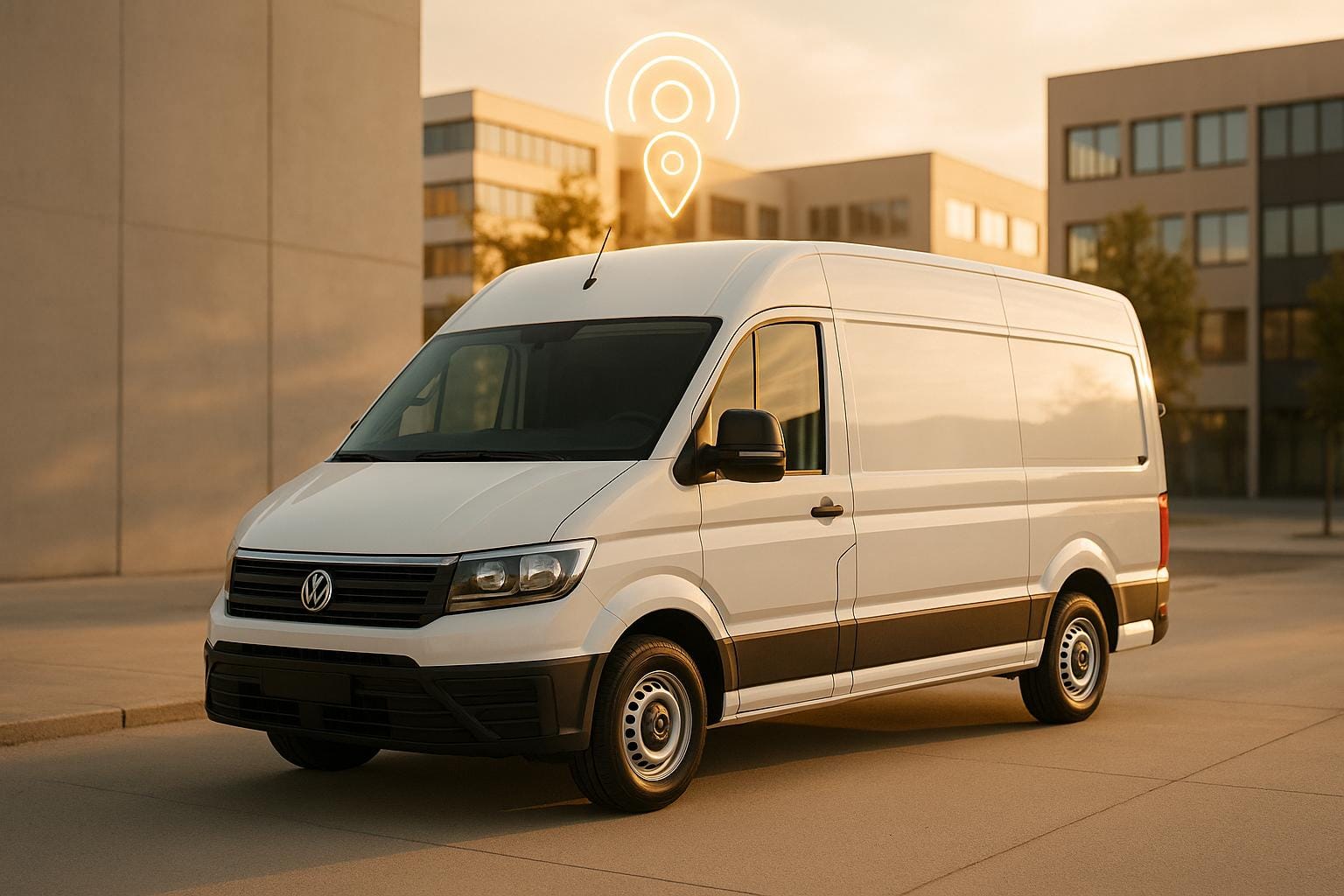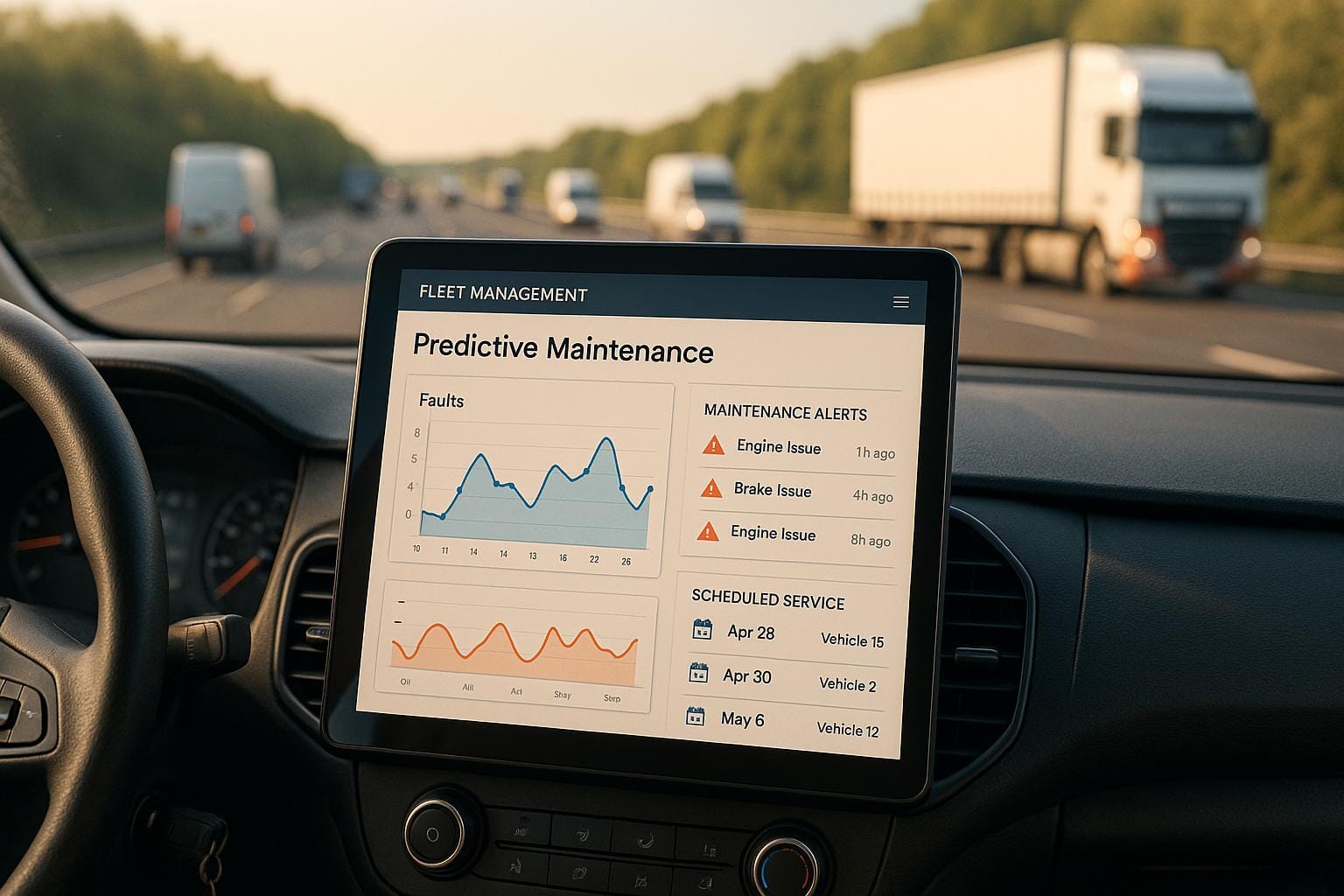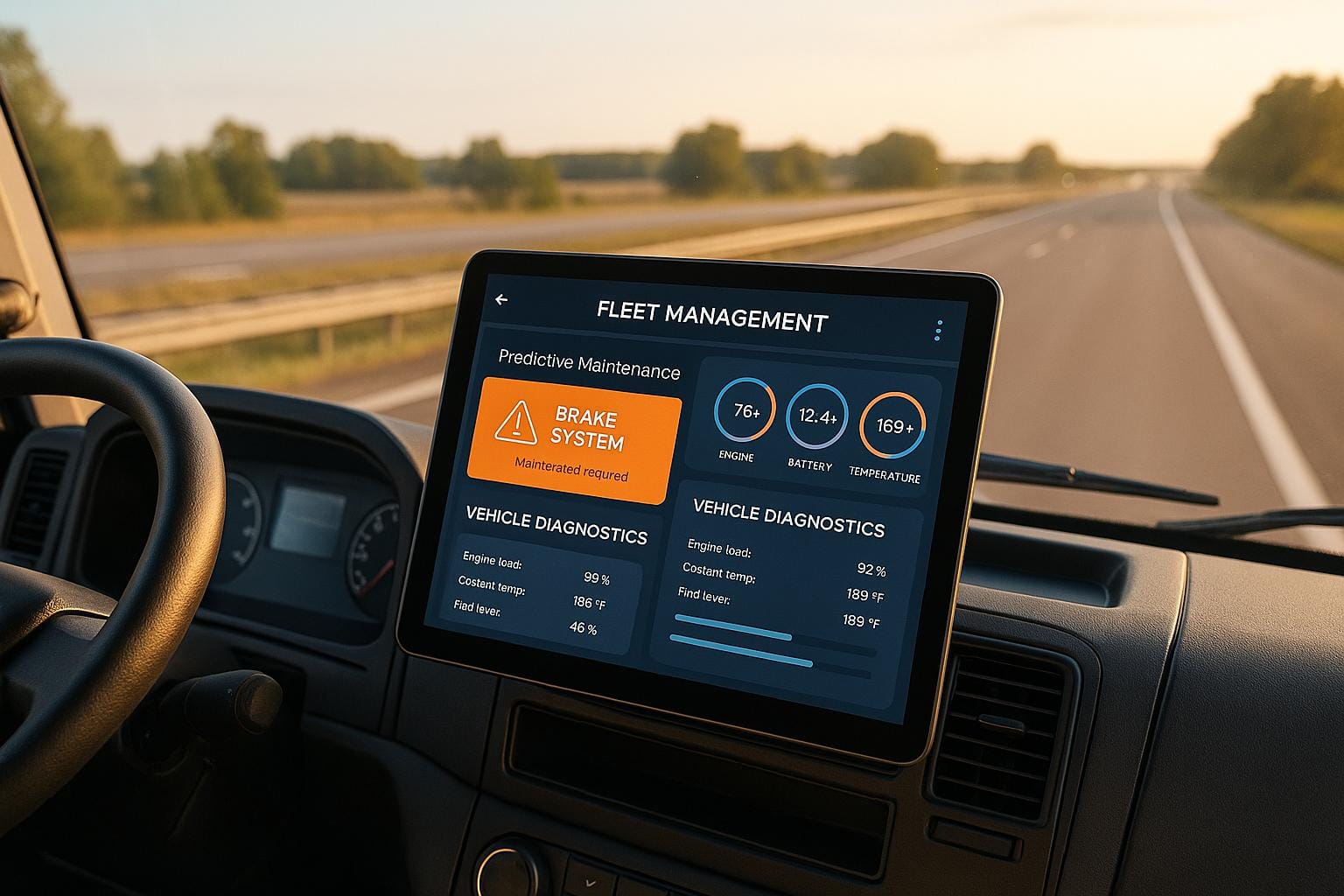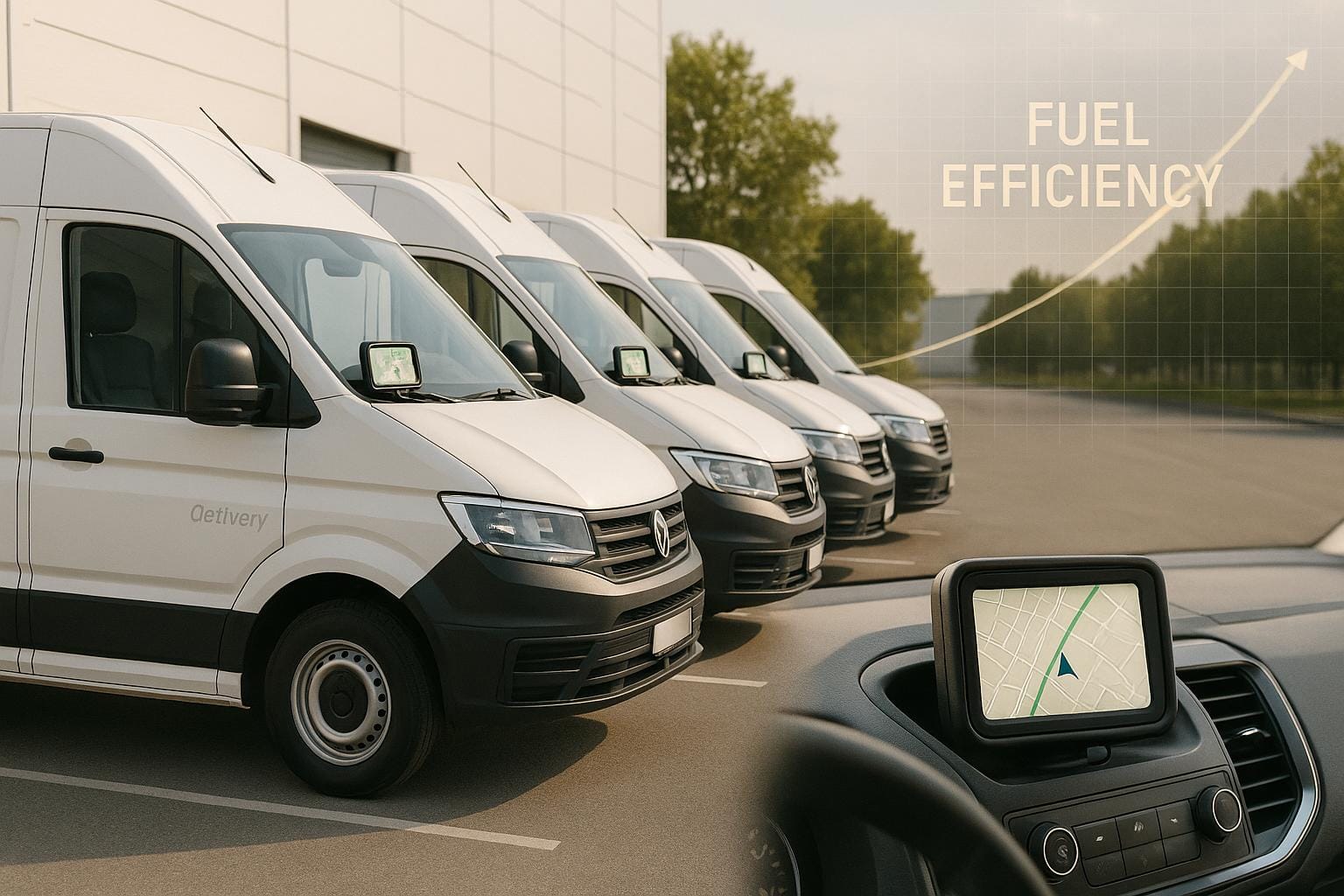Protect your van and save money with a GPS tracker. Vans are stolen every day in the UK, and over half are never recovered. A GPS tracker can help you:
- Prevent theft: Real-time tracking, geofencing alerts, and remote immobilisation stop thieves in their tracks.
- Recover stolen vans quickly: Top systems boast a 95% recovery rate, often within 24 hours.
- Lower costs: Save on insurance premiums (up to 33%) and cut fuel expenses by up to 15% with route optimisation and idle time monitoring.
- Streamline fleet management: Track driver behaviour, reduce admin time, and improve efficiency.
Quick Comparison of GPS Tracker Models
| Model | Features | Ideal For | Monthly Cost |
|---|---|---|---|
| Essential | Real-time tracking, basic geofencing | 1–5 vans | £12.99 |
| Enhanced | Advanced geofencing, driver monitoring | 5–20 vans | £16.99 |
| Ultimate | Remote immobilisation, dashcam option | Large fleets | £19.99 |
Investing in a GPS tracker is a smart move for van security and operational savings. Keep reading to learn how these systems work, must-have features, and how they can benefit your business.
Top 4 BEST GPS Trackers (2025) | Features & Installation | SafeTag Trackers
How GPS Trackers Stop Van Theft
GPS trackers play a vital role in protecting vans by offering real-time location tracking and enabling quick action against theft. These systems combine precise monitoring with advanced tools to safeguard vehicles effectively.
24/7 Location Monitoring
With round-the-clock tracking, van owners can keep an eye on their vehicles at all times. The system sends alerts for any unauthorised movement through features like:
- Geofencing: Notifies owners when the van leaves a set area.
- Instant notifications: Updates sent directly to smartphones.
- Police integration: Provides law enforcement with live location data.
Top-tier security providers boast a 95% recovery rate, with most stolen vehicles retrieved within 24 hours. These systems are directly linked with law enforcement, including over 2,000 police patrol vehicles and the National Police Air Service helicopter fleet. Together with remote shutdown capabilities, they create a robust defence against theft.
Remote Vehicle Shutdown
Remote immobilisation technology adds another layer of protection by safely disabling the van's ignition. This feature stops the vehicle in a controlled manner, reducing the risk of accidents while deterring thieves.
Thanks to this technology, law enforcement has made 3,138 arrests and recovered assets worth over £626 million from vehicles fitted with trackers. By combining real-time tracking and remote shutdown, van owners can protect their vehicles and ensure swift recovery if theft occurs.
Must-Have GPS Tracker Features
Choosing the right GPS tracker for your van involves more than just picking a device that shows location. To ensure your vehicle's security and comply with UK standards, you need a tracker with specific features that enhance protection and streamline fleet management. Here's what to look for to get the most out of your GPS tracking system.
Device Build Quality
A reliable GPS tracker starts with durable hardware. It should be built to handle tough conditions and deter tampering. For vehicles carrying dangerous goods, compliance with ADR specifications is especially crucial, as noted by a leading installer in Chorley.
Key hardware features include:
- Dual-tracking systems for added reliability
- Weather-resistant housing with proper IP ratings
- Tamper-proof mounting to prevent interference
- Backup battery support to maintain power during outages
Tracking Platform Functions
Modern GPS platforms offer much more than just location tracking. They combine security tools with fleet management capabilities, helping businesses improve efficiency while protecting their vehicles.
| Feature Category | Key Functions | Business Benefits |
|---|---|---|
| Tracker Security | Geofencing alerts, Remote immobilisation | Prevents theft, Enables quick recovery |
| Fleet Efficiency | Route optimisation, Driver behaviour analysis | Cuts fuel costs, Boosts productivity |
| Reporting | Custom alerts, Performance metrics | Informs decisions, Controls costs |
UK Data Protection Standards
Adhering to UK data protection laws, such as the Data Protection Act and GDPR, is a legal requirement when using GPS tracking. These regulations ensure that location data is handled responsibly.
"The definition contained in GDPR clearly states that data about the location is personal data", says Marcin Pustelnik, Lawyer in TransLawyers.
Key compliance steps include:
-
Data Protection Measures
Use encrypted data transmission, secure storage, and restricted access to safeguard location information. -
Employee Privacy Considerations
When tracking company vehicles, employers should:- Inform drivers about how their data is used
- Enable privacy settings for non-working hours
- Keep detailed records of data access
- Obtain explicit consent for tracking
-
System Security Features
Ensure your GPS tracker includes:- Password-protected access
- Encryption protocols
- Regular software updates
- Automated controls for data retention
GRS Fleet Telematics Solutions
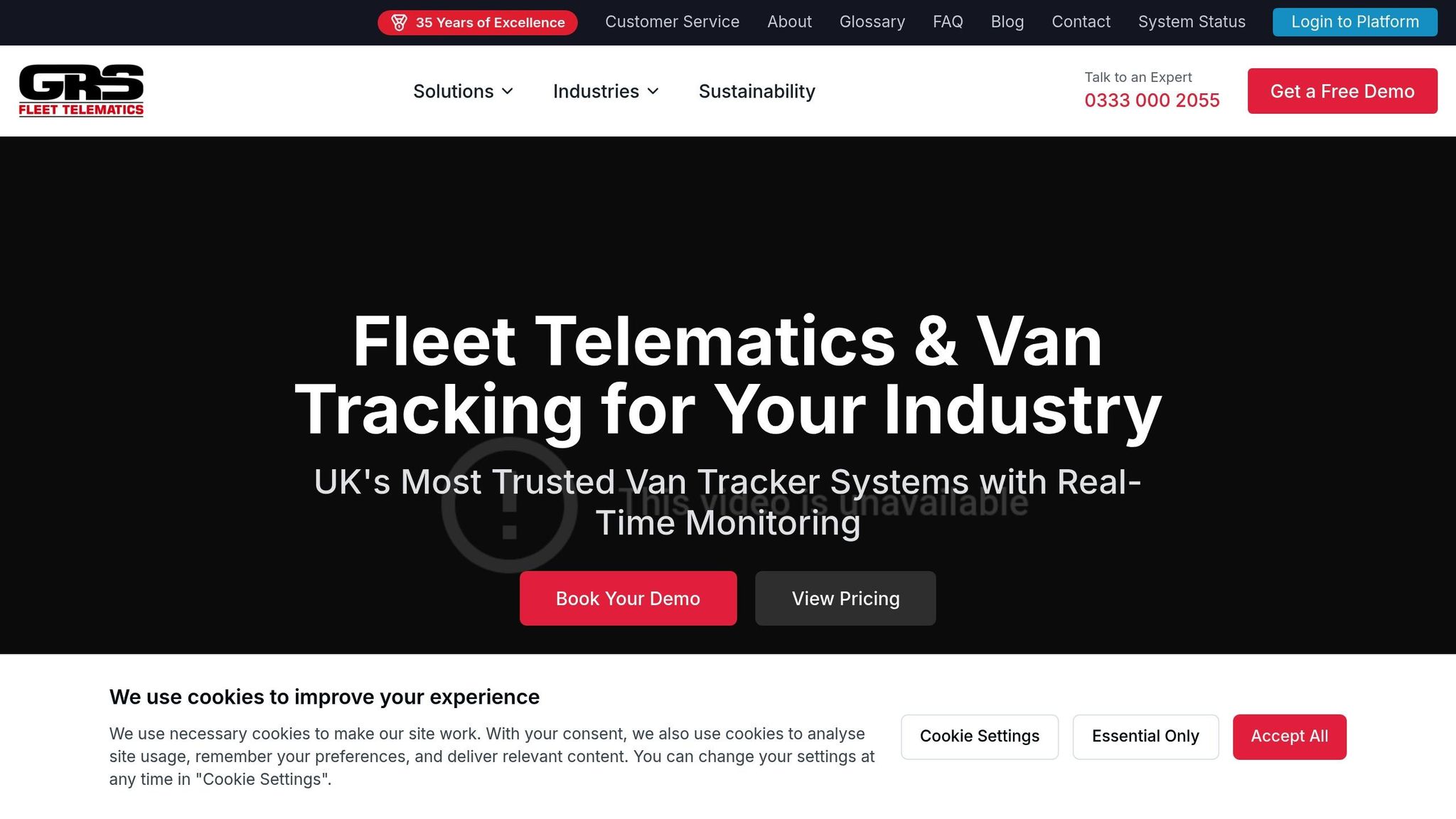
GRS Fleet Telematics provides van tracking solutions specifically designed for UK businesses, offering advanced tools to help safeguard vehicle fleets.
GRS Tracker Models
GRS has developed three tracker models, each tailored to meet varying security needs and fleet sizes:
| Model | Key Features | Ideal For | Monthly Cost |
|---|---|---|---|
| Essential | Real-time GPS tracking, basic geofencing, 90-day history | 1–5 vans | £12.99 |
| Enhanced | Advanced geofencing, driver behaviour monitoring, 12-month history | 5–20 vans | £16.99 |
| Ultimate | Remote immobilisation, integrated dashcam option, unlimited history | Large fleets | £19.99 |
All trackers feature tamper-proof mounting and dual-tracking technology for added dependability. The Enhanced and Ultimate models also include automated timesheet functionality and detailed driver behaviour analysis.
In addition to these models, GRS offers a robust recovery service to quickly respond to theft incidents.
Vehicle Recovery Services
GRS's recovery system is designed to minimise downtime with a 95% success rate in recovering stolen vehicles within 24 hours. The system uses immobilisation technology that activates only when the vehicle is stationary or moving at speeds under 10 mph, ensuring a safe recovery process.
The recovery process follows these steps:
- Instant Detection: Alerts are triggered automatically when unauthorised movement is detected.
- Verification Protocol: The 24/7 monitoring team confirms theft with the vehicle owner.
- Active Recovery: Real-time tracking is used to coordinate directly with local police.
- Post-Recovery Support: Security assessments and insurance assistance are provided after recovery.
Costs and Fleet Options
GRS offers flexible pricing to accommodate different fleet sizes, with discounts available for larger fleets.
For medium fleets (6–20 vehicles), pricing is as follows:
- Essential tracker: £129 per unit (monthly from £10.99 per vehicle)
- Enhanced tracker: £179 per unit (monthly from £14.99 per vehicle)
- Ultimate tracker: £229 per unit (monthly from £17.99 per vehicle)
For large fleets (21+ vehicles), pricing is structured as:
- Essential tracker: £109 per unit (monthly from £8.99 per vehicle)
- Enhanced tracker: £159 per unit (monthly from £12.99 per vehicle)
- Ultimate tracker: £209 per unit (monthly from £15.99 per vehicle)
Additional services include:
- Dashcam integration: £99–£149 per vehicle
- Custom geofencing setup: £50 (one-time fee)
- Advanced driver reporting: £3.99 per vehicle, monthly
All packages come with professional installation, basic training sessions, and access to the GRS platform. Contracts range from 12 to 36 months, with longer agreements offering additional savings. For fleets of more than 50 vehicles, bespoke enterprise solutions with dedicated account management are also available.
GPS Tracker Cost Benefits
Lower Insurance Costs
Installing GPS trackers can lead to noticeable reductions in van insurance premiums. Many insurers acknowledge that these systems enhance vehicle safety and lower risks, which often results in discounted premiums. For instance, several providers offer savings for vehicles equipped with GPS tracking:
| Insurance Provider | Potential Discount |
|---|---|
| AAA Insurance | Up to 18% |
| Liberty Mutual | Up to 25% |
| USAA Insurance | Up to 33% |
Research shows that vehicles with GPS tracking experience 20% fewer accidents, further supporting their value in reducing insurance costs.
"21st Century Insurance gives 15 percent off its comprehensive coverage premium for theft recovery devices like GPS trackers. Nationwide offers anti‐theft discounts based on the state you live in and based on the type of device you install. Geico says customers can get up to a 25 percent discount."
These savings on premiums add to the overall benefits of GPS tracking, which extend beyond insurance.
Fleet Running Cost Savings
The advantages of GPS trackers go beyond insurance, offering substantial savings in fleet operations by improving management efficiency and encouraging better driving habits.
Fuel Consumption Reduction
GPS systems help identify and address inefficiencies that can drive up fuel costs. For example, increasing speed from 65 to 75 mph can raise fuel consumption by as much as 20%. Similarly, idling unnecessarily can waste up to a gallon of fuel per hour. GRS's Enhanced and Ultimate trackers assist fleet managers by enabling them to:
- Monitor and reduce excessive idling
- Identify harsh acceleration
- Plan and optimise routes
- Address speeding issues
Maintenance Cost Optimisation
Proactive maintenance supported by GPS tracking helps avoid expensive breakdowns and prolongs vehicle life. These systems monitor mileage, analyse engine performance, and send diagnostic alerts, ensuring timely servicing and reducing unexpected repair costs.
"Fleet tracking is a set of eyes and ears that gives you instant data and allows you to rely less on memory, more on information. The smoother your fleet operates, the more money accrues, day after day." - Jeramy Gordon
Conclusion
GPS trackers have become a smart security measure for van owners and fleet managers, offering a mix of protection and operational benefits. Research shows that businesses using GPS tracking can cut fuel costs by up to 15%, while also dramatically improving the chances of recovering stolen vehicles. These advantages are clearly reflected in practical examples.
Take Vicki Laake, office manager at Papalia Home Services, who shared:
"It keeps us efficient and helps pinpoint lost vehicles, minimising travel time between jobs".
Beyond security, GPS tracking delivers a range of business perks, including:
- Lower Costs: By optimising routes and monitoring driver behaviour, businesses can reduce fuel consumption, which is often the second-highest expense after payroll.
- Improved Efficiency: Fleet management tasks - from pre-trip checks to job dispatching - become more streamlined with digital tools.
- Insurance Savings: Many insurers offer discounted premiums for vehicles equipped with GPS trackers.
As Fleetsmart puts it:
"GPS trackers offer a robust solution to these issues, providing real-time insights and data-driven management capabilities".
FAQs
How does remote immobilisation in GPS trackers improve van security?
Remote Immobilisation: A Game-Changer for Van Security
Remote immobilisation is a cutting-edge security feature that lets you disable your van's ignition from afar. This means if someone tries to take off with your vehicle without permission, they won't get very far. It’s a practical way to stop thieves in their tracks and keep your van exactly where it belongs.
If your van is ever stolen, this feature can make a big difference in how quickly and safely it’s recovered. By preventing the vehicle from being driven, remote immobilisation reduces the risk of damage and increases the chances of getting it back in good condition. For van owners and fleet managers, it’s a smart way to protect your assets and enjoy some well-earned peace of mind.
What features should a GPS tracker have to comply with UK data protection laws?
To align with UK data protection laws, a GPS tracker must be designed to support legitimate business purposes while ensuring clear and transparent monitoring. Employers or fleet managers should openly communicate with employees or drivers about why tracking is being implemented and, where required, obtain their consent.
The information gathered should strictly serve its stated purpose, such as enhancing fleet operations or maintaining vehicle safety. Moreover, it’s essential to ensure the tracker includes strong data security measures to protect sensitive information and guard against unauthorised access.
How do GPS trackers help lower the costs of managing a van fleet?
How GPS Trackers Help Cut Costs for Van Fleets
GPS trackers can be a game-changer for managing van fleets, offering a practical way to save money while boosting efficiency. One of the key benefits is route optimisation. By identifying the most efficient routes, these systems help cut down on fuel usage and reduce travel time, which directly lowers operating costs.
They also monitor driver behaviour, such as speeding or excessive idling, revealing opportunities to improve fuel efficiency and minimise wear and tear on vehicles. Over time, this can lead to less frequent repairs and a longer lifespan for your fleet.
On top of that, GPS trackers simplify admin work. Tasks like mileage tracking and route logging can be automated, saving time and reducing the need for tedious paperwork. Plus, in the UK, many insurance providers offer discounts for fleets equipped with GPS systems, adding another layer of savings.
In short, GPS trackers aren’t just about knowing where your vehicles are - they’re a smart investment for cutting costs and making fleet operations smoother.

